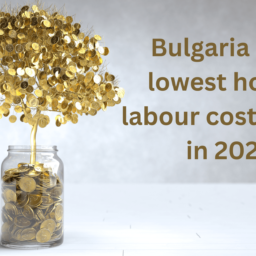
The Organization for Economic Co-operation and Development (OECD) has projected that Bulgaria will join the eurozone in 2026. The organization expects the country’s economic growth to rise from 2.3% in 2024 to 2.8% in 2025, before moderating to 2.6% in 2026. These figures reflect a downward revision from earlier forecasts made in May, when the OECD had predicted slightly higher growth rates of 2.5% in 2024 and 2.9% in 2025.
Inflation is expected to follow a similar downtrend. The OECD revised its inflation forecast for 2024 to 2.4%, with a slight increase to 2.7% in 2025, before it is anticipated to ease to 2.5% by 2026. This represents a reduction from its spring projections, which anticipated higher inflation rates of 3% for 2024 and 2.8% for 2025.
Despite these adjustments, the OECD’s report suggests that Bulgaria’s economy will be supported by low unemployment and stable real income growth, which should drive household consumption. Unemployment is projected to remain low, at 4.2% in 2024, with slight reductions to 4.1% in 2025 and 4% in 2026.
Investment in Bulgaria has slowed recently, but the situation is expected to improve as EU funding resumes. Exports are predicted to recover as economic conditions in the EU improve. While inflation is easing, the report highlights that wage pressures remain high, and continued political uncertainty may hinder necessary reforms and investments.
In terms of fiscal policy, the OECD notes that Bulgaria’s government has expanded spending on wages, pensions, and social benefits, which has contributed to widening the fiscal deficit. However, fiscal consolidation is necessary to manage demand pressures and ensure sustainable public finances. The organization stresses that further reforms are needed to address labor shortages and ensure long-term economic stability. These include reforming the systems for setting minimum wages and pensions, as well as implementing active policies to reduce emigration and encourage the return of Bulgarians to the workforce.
The OECD also suggests that Bulgaria should focus on improving vocational training and matching skills to market needs through collaboration with the private sector. It emphasizes the importance of implementing reforms under the Recovery and Resilience Facility to unlock EU funding and boost investment, especially in the areas of green energy transition and decarbonization.
The country’s fiscal policy is described as expansionary, with increased public sector wages and social spending. However, the OECD notes that the government’s investment in projects has contracted due to delays in EU fund absorption, which has led to an increased budget deficit. Fiscal tightening, in terms of interest rates, remains slow due to high liquidity in the banking sector.
Technical preparations for Bulgaria’s eventual adoption of the euro are progressing. However, the OECD calls for more prudent fiscal policies and structural reforms to ensure fiscal sustainability, address demographic challenges, and reduce the risks of rising long-term spending pressures. The government has yet to publish a medium-term budget plan, which is required by the EU.
Source:https://m.novinite.com/
















